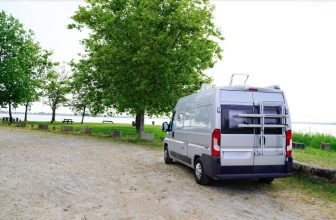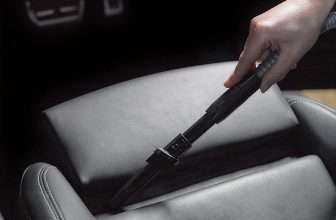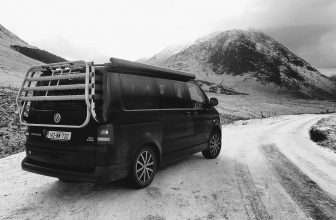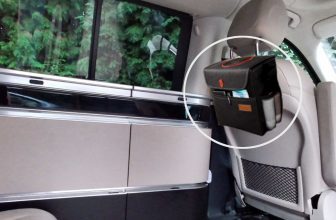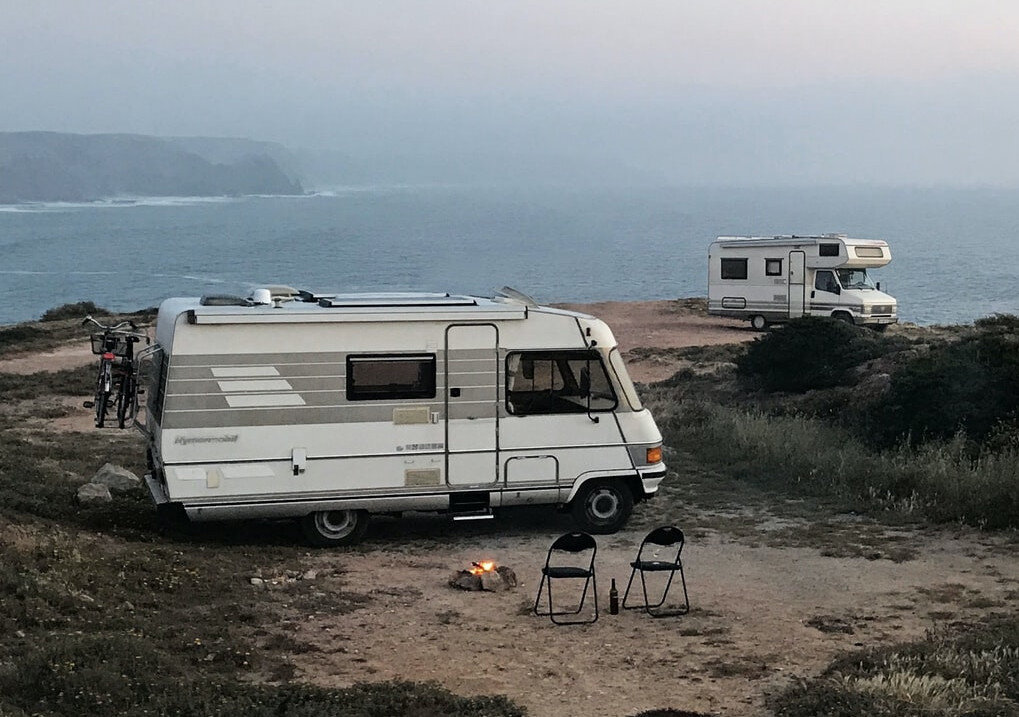
It’s the age old dilemma which really doesn’t have a solution but we’re going to try anyway. The trade-off between the pros and cons of caravan vs campervan vs motorhome has vexed campers since time immemorial, and shows no sign of slowing pace. What do you go for and why?
Our Camping Journey?
First a little about our journey on these rocky roads. Alison and I were enthusiastic tent campers for many years – we loved the low cost of the gear (our tent cost a few hundred quid – photo below), the fact our whole set of camping gear could fit in a car boot and the ‘back to nature’ sense of the camping experience. Being in a tent can feel exciting – you get all the sounds and smells (!) of nature, and can be exposed to extreme weather conditions. It’s a blast!

Our final tent before the caravan – the Outwell Oregon 5 – we still own this bad boy and use it occasionally for retro thrills!
So what changed?
Well we started getting the green eyes of envy basically. At each Camping and Caravanning club site we stayed at, we would see lots of people (usually a bit older than us) watching TV in their caravans or parking up their motorhome with some bikes strapped on the back. It looked grown up and responsible. It looked sophisticated. It looked like a Brave New World we knew nothing about. Plus they had kitchens with fridges and cookers. In short, we wanted in!

Our First Caravan – the Bessacarr Cameo 465 SL
This was back in 2009 and we had a baby daughter on the way. We quickly found out that caravans offer by far the best value for money out of the three ‘homes on wheels’ options. You can get a highly reasonable caravan for not alot of money (say a few thousand pounds) whereas even the cheapest campervans are significantly more unless you’re happy to make do with a 30 year old Yank Tank with an 8 litre petrol engine on board! We promptly bought a 9-year old Bessacarr Cameo caravan for around £5k locally and really really loved it for a few years……
…. until we got a bit frustrated with the layout, and moved on to a caravan which was better suited to us (2012 Swift Challenger 590). But then we felt that the Swift took up too much space on our drive and we didn’t want to have to fetch it from storage every time we wanted to go camping. The idea for a camper van started bubbling and fermenting and eventually burst out with us buying a Mercedes Marco Polo for a whopping £48000 in 2018
 We haven’t looked back, but you can clearly see the financial difference between that final tent (£200), first caravan (£5k), second caravan (~£14k) and first (admittedly brand new) campervan (£48000).
We haven’t looked back, but you can clearly see the financial difference between that final tent (£200), first caravan (£5k), second caravan (~£14k) and first (admittedly brand new) campervan (£48000).
Is the campervan 240x better than the tent? Well possibly yes in all that it can do, but that is the purpose of this post – to see what is and what isn’t important for your particular lifestyle and requirements.
Identify Your Key Camping Requirements
If you’re reading this then you may already own a caravan, campervan or motorhome and are thinking about a transition between them. I call this the ‘sideways move’ in terms of functionality. A motorhome is essentially a caravan with an engine, and a campervan is essentially a small motorhome. We will discuss below what the key differences, considerations and compromises are and why the small distinctions between ‘the Holy Triumvirate’ can be important.
Alternatively you may be tent owners who are looking to move up the hierarchy of luxury into something more solid and warm. This is a different consideration. You know for a fact that you’re going to be spending more money, but what are you gaining and what are you losing? Let’s find out…..
Contents
ToggleCaravan vs Campervan vs Motorhome – the differences
First let’s give you our definitions of these vehicles with habitation.
- Caravan – a fibreglass shell “body” consisting of multiple bonded panels attached to a wheeled trailer with no engine. The body contains living space typically consisting of bathroom, kitchen, tables and seating areas as well as sometimes a fixed bed or bunk. The caravan can be towed by a motor-powered vehicle to your destination and then set-up leaving the vehicle free to use separately – a key advantage of caravans. Caravans also don’t require road tax or insurance by law.
- Motorhome – essentially very similar to the above, but with a front cab section and engine included. With a motorhome you don’t need a separate tow vehicle and can simply drive to your destination and park up. Motorhomes can be based on panel vans and converted into a motorhome (B-Class), or can be bespoke “coach-built” vehicles with the cab fully integrated into the living area (A-Class), or alternatively may use the front section, engine and floorpan of a truck with the habitation section bolted on top (C-Class). Motorhomes typically range from 5-6m in length for the panel van types, up to 7-8m or even longer and can sometimes have sleeping areas above the cab or incorporate novel technology like drop-down beds.
- Campervan – a campervan is a small motorhome which is much more nimble and driveable than a motorhome, but perhaps not as easy and luxurious to live in – perhaps the most famous example is the classic VW Camper. You can essentially use a campervan like a car (we don’t own a car and just use our Marco Polo as one), but you have to be prepared for a lack of storage space and constant reconfiguration of the onboard layout. For example, your seating area may have to transform into a bed at night which limits people staying up while others want to sleep.
Pros and Cons of a Caravan

Positives of Caravans
A caravan is a very affordable step-up from a tent and they make excellent second-hand used buys. As a brand new purchase you get that pristine “new car” smell, but you will inevitably be paying in the £15000-£25000 region. Larger American-style “Fifth Wheelers” can be even more expensive. We therefore recommend making a second hand used purchase whereby you can pay much less and get excellent examples which are not particularly old (say 3 years) for <£10000.
Depreciation on caravans (and indeed campervans and motorhomes) is low. Our Swift Challenger caravan cost ~£14k when we bought it used and we sold it back to the same dealer for around £12k after three years – they offer a great cost of ownership because of this.
Caravans offer an excellent camping experience – you have a decent living space on wheels which you can tow to your destination. Often incorporating 240V and 12V electrics as well as gas for the oven and fridge, you can live very comfortable – in fact some people live full time in their caravans!
Flexibility is high from a camping perspective – as we mentioned above, you can tow your caravan to a campsite and then decouple your car and use it to visit the local area – very convenient having that ability to separate the two, because with both campervans and motorhomes you are slightly stuck at a campsite unless you bring bikes, scooters or even a small car towed behind as I’ve occasionally seen!
Downsides of caravans
This is based on our own personal experience and may differ for other people.
Possibly the biggest annoyance we found with our caravans was the weight and restrictions on the car we had to buy to tow them. Yes you can buy smaller, more lightweight caravans such as the excellent Eriba but most ‘standard’ caravans are significantly over 1300kg and thus require a heavy, powerful car to tow them. This can push up the total cost of your rig.
For reference, we owned a Volvo V70 2.4 diesel which struggled to tow our Bessacarr caravan, a Ssangyong Rexton 4×4 which could not get up the hills with a caravan on the back and a Mercedes R-Class which functioned well. The Mercedes was certainly the best towcar of the bunch but was a huge, thirsty car which cost alot to repair when the air suspension went. In short, you cannot treat a caravan as a single entity – you must consider the costs of the car and the caravan as an ensemble. Motorhomes and campers don’t have this issue.
Storage and Maintenance
Then you have storage. We initially put our caravan in a local storage compound which cost ~£400 a year – a not insignificant amount! The added hassle of driving to and from that storage before and after our trips away took the sheen off our adventuring and so we looked for other options. In the end we just decided to keep it on our drive which was luckily big enough to house it.
Now caravans are many things, but being beautiful architectural structures is not one of them. The driveway was now congested and we had a great view of the roof of the van getting green moss growing on it through the year.
And then there was the pain of ownership – feeling that you’re not using the item enough to justify it sitting on your drive. We felt that we had to use the caravan, even if we didn’t particularly want to because it was always looking at us forlornly! I mean, what is a caravan if you don’t use it for a month – it’s a block of fiber glass sat on your drive!
Maintenance was a bit of a pain too – you feel obliged to insure and service the caravan (several £00s a year), but there is also cleaning inside and out after a trip. Yes, this is the case with the other options too, but with a caravan it somehow feels more hassle and is difficult to get somewhere for someone else to do it for you!
Set-up Time
Caravans probably take the longest out of the three options to set-up and take down when you arrive or leave a campsite. This is because they need levelling and their legs wound down for stability. It’s not a particularly onerous task in all honesty, but is definitely noticeable when your campervan buddies are already sat in their camping chair drinking beer. Grr, I’m angry now just thinking about it!
Other jobs such as filling up a water barrel, connecting the electrical mains hookup or emptying the loo and waste water are jobs you have to do on a motorhome too and so not unique. Saying that, most motorhomes have onboard storage for water and waste, and so you may not have to do it so frequently, and you can just drive to a dedicated bay at the campsite when required.
Pros and Cons of Motorhomes

Positives of Motorhomes
Motorhomes are often viewed as the ultimate leisure vehicle, combining luxurious living quarters with ease of driving and quickness of setup.
With water tanks on board (both fresh and waste), you can be fairly self-sufficient in a motorhome and live ‘off-grid’ quite easily. Fridge and heating can run off an onboard gas supply.
We’ve never owned a motorhome, but have seen many examples either owned by friends or at dealers. Personally my favourite type are the A-Class motorhomes which have ‘Captain’-style front drivers and passenger seats which swivel around to form an intimate and practical connection with the rest of the living space. With other features like drop-down double beds (sometimes motor-driven) and separate bathrooms, bedrooms and upper cab sleeping areas, motorhomes are often very luxurious.
Driving a motorhome is in some ways simpler than towing a caravan. Firstly, you don’t have to worry about buying a capable towcar as a suitable engine is already included on board. Maneuverability is also improved over a caravan – for example, if you meet oncoming traffic on a tight road, it is easier to reverse and turn a motorhome compared with a caravan, and the allowed top speed on the motorway is also higher (70mph vs 60mph). You get to your destination quicker!
Set-up and pack down time at campsites is also noticeably faster with a motorhome. We had friends in a large Bessacarr motorhome who would park up and be drinking beer within 5 minutes of arriving on a flat pitch – simply plug in the mains hookup and job done. Caravans can take much longer, especially with an awning.
Finally it’s worth mentioning the superior strength of the motorhome frame compared with a caravan – the sidewalls and roof are much stronger and can carry more weight. As a result, motorhomes can support bike racks on the back and often you can even stand (or sunbathe) on the roof. Moreover, motorhomes can employ split level design, often with sleeping pods or cabs up in the top close to the roof. It allows more efficient use of space than caravans.
Downsides of motorhomes
So motorhomes are basically amazing aren’t they? Well, yes, but there are some notable negative factors to consider.
- Price – motorhomes are expensive, with the most luxurious examples costing well over £100,000 to buy from new. More typically you will expect to pay in the £50000-80000 range, but this is still eye-wincingly high. Even when buying second-hand, it is difficult to find non-tatty examples for less than £20000, which is significantly higher than caravans.
- Storage and space – due to the size of most motorhomes, they are not much use as day to day vehicles. Their size prohibits easily driving around small towns and villages, and the height means you cannot get into supermarket car parks for example. Just not that practical for anything other than camping up somewhere. Similarly, storing the motorhome when not in use can be a pain – they just take up alot of space!
 Transport at camping destinations – when you’re parked up at a campsite, you want to be able to look around the local area, and as mentioned above, this is difficult in a motorhome if you want to nip into the local village for a coffee or pint. Motorhome owners therefore need to use alternative transport in these situations and even consider towing a small car to use – more cost and hassle!
Transport at camping destinations – when you’re parked up at a campsite, you want to be able to look around the local area, and as mentioned above, this is difficult in a motorhome if you want to nip into the local village for a coffee or pint. Motorhome owners therefore need to use alternative transport in these situations and even consider towing a small car to use – more cost and hassle!
So while there are not many downsides of motorhomes, those that do exist are fairly major ones. You will need to ponder carefully to see if they will impact on your choice of leisure vehicle.
Pros and Cons of Camper Vans

In our view, the campervan is the ultimate leisure vehicle because it combines flexibility, style and practicality with a small size for a quick and easy camping lifestyle. With a towbar on the back of your campervan you can even tow a small caravan too (like an Eriba or teardrop caravan) if you need additional sleeping space.
Pros of a camper van
Camper vans are typically based on standard vans from the manufacturer (e.g. VW Caravelle for the California, Mercedes V-Class for the Marco Polo) and then transformed into the vehicles we know and love.
Campervans are smaller than motorhomes and are typically in around 5m in length and 2m tall, although of course these dimensions can vary alot. We would definitely aim for a maximum height of just under 2m as then you can park in NCP multistory car parks ok.
The small size of campervans means that you can effectively use them as a car – indeed we no longer own a car and just use our Mercedes Marco Polo as our only vehicle. This works well when on camping trips because you can quickly packup the van if you want to visit the local town, and although this can be a slight nuisance rearranging the seats and putting the roof down, it is much easier than doing the same in a motorhome.
Campervans often have pop-tops which rise up out of the roof and provide a double bed upstairs, and this sums up the sort of reconfigurability on offer. Their outwardly small size becomes an advantage whilst numerous innovative internal features enable the interior space to be optimized for whatever it is you need to do – e.g. cooking or sleeping for example.
 Campervan bodies are metal which in my view is an advantage over the fiber glass of caravans and most motorhomes. It provides better security and safety, and can be made to look more stylish and less overtly leisure vehicle. I deny anyone to say that the VW campers look anything other than amazingly cool.
Campervan bodies are metal which in my view is an advantage over the fiber glass of caravans and most motorhomes. It provides better security and safety, and can be made to look more stylish and less overtly leisure vehicle. I deny anyone to say that the VW campers look anything other than amazingly cool.
Downsides of Campervans
Again it’s the price – campers are not cheap even if you buy a base van (e.g. VW Transporter) and convert it yourself, it is difficult to get change out of £30-£40k or even more. The manufacturer-made campervans are pushing £60-70k these days when you’ve added on all the requisite optional extras which you think you need.
Another negative is the size – well hold on a minute I hear you cry! You’ve just told us how the small size means the campervan is more flexible than a motorhome. Well this is true, but it comes with a downside – constant reconfiguring of the internal space – for example, if the downstairs seats have been flattened out into a bed then it’s hard to move around inside a campervan and you can’t get into the cupboards easily – so you have to put the seats back up to do what you want to do. You find that everything has its place and so you have to be on top of things to keep the campervan tidy and pleasurable to live in. Bear in mind that it’s not always as relaxing as you’d like!
The small size also means that if you have a family that you may need an awning or similar to expand your living space. These add a bit more faff to your camping trip, taking space up in the boot and an extra 15-30 minutes of setup (and packup) time.
So really it’s price and space which are the main negatives of camper vans. You’re unlikely to have a toilet on board, so you may wish to consider buying a portable loo for times when you have no facilities available.
Caravan vs Campervan vs Motorhome – the Verdict
So what’s our conclusion? Well we eventually voted with our feet and bought a campervan and do not regret it. Yes it is extremely expensive and we get that a caravan offers better value for money – however there is something about the speed and ease of use of a campervan which is very appealing. You can literally chuck a packed bag into the back and head off in 5 minutes. Nothing about a caravan says ‘speed’ or ‘adventure’, whereas a campervan screams it from the rooftops.
Campervans are much more nimble than motorhomes and can be used as a car-replacement if necessary – they therefore have use outside your normal camping trips and holidays which cannot be said for caravan or motorhome. However space can be an issue which you don’t get with the other two.
We recommend that you think carefully about your options if you’re in the market for a new leisure vehicle. If you’re anything like us you will progress through different stages of camping life, possibly trying different options as you age. There’s still time for us to get that big Winnebago or Fifth Wheel caravan, but at the moment we’re still loving our camper van, with several tents available if we fancy something different.
Good luck in your hunt!




